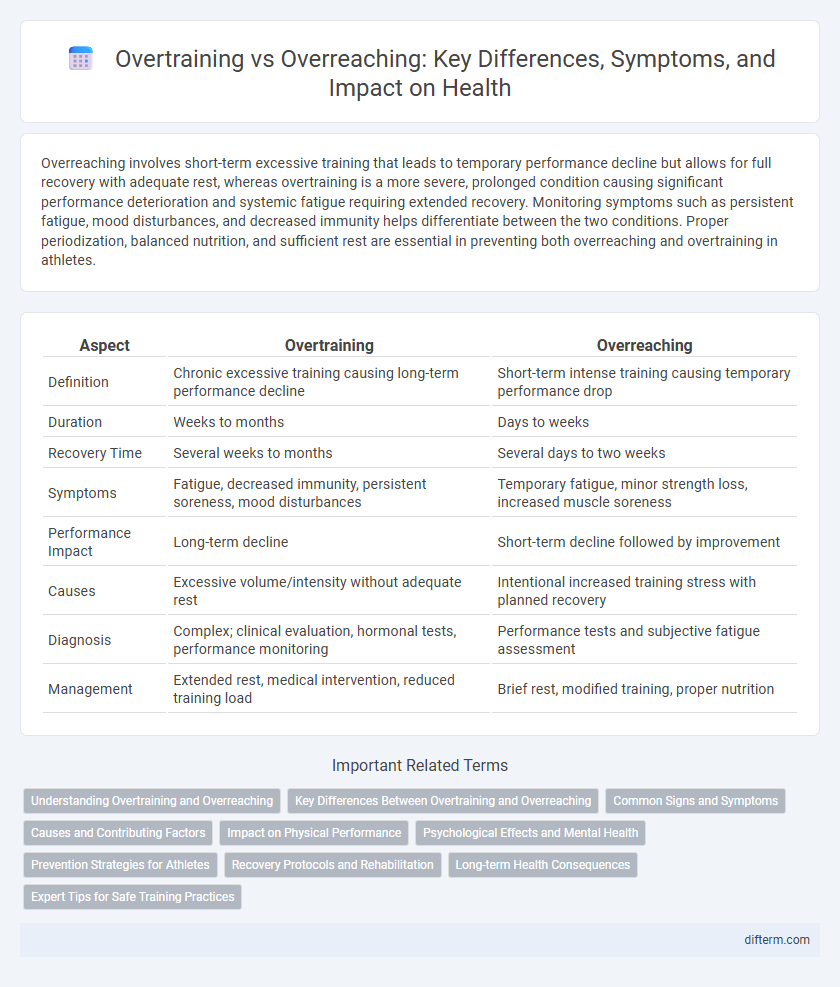Overreaching involves short-term excessive training that leads to temporary performance decline but allows for full recovery with adequate rest, whereas overtraining is a more severe, prolonged condition causing significant performance deterioration and systemic fatigue requiring extended recovery. Monitoring symptoms such as persistent fatigue, mood disturbances, and decreased immunity helps differentiate between the two conditions. Proper periodization, balanced nutrition, and sufficient rest are essential in preventing both overreaching and overtraining in athletes.
Table of Comparison
| Aspect | Overtraining | Overreaching |
|---|---|---|
| Definition | Chronic excessive training causing long-term performance decline | Short-term intense training causing temporary performance drop |
| Duration | Weeks to months | Days to weeks |
| Recovery Time | Several weeks to months | Several days to two weeks |
| Symptoms | Fatigue, decreased immunity, persistent soreness, mood disturbances | Temporary fatigue, minor strength loss, increased muscle soreness |
| Performance Impact | Long-term decline | Short-term decline followed by improvement |
| Causes | Excessive volume/intensity without adequate rest | Intentional increased training stress with planned recovery |
| Diagnosis | Complex; clinical evaluation, hormonal tests, performance monitoring | Performance tests and subjective fatigue assessment |
| Management | Extended rest, medical intervention, reduced training load | Brief rest, modified training, proper nutrition |
Understanding Overtraining and Overreaching
Overtraining occurs when an athlete trains beyond the body's ability to recover, leading to prolonged performance decline and increased risk of injury, whereas overreaching is a short-term increase in training load that causes temporary fatigue but allows for recovery with proper rest. Distinguishing between overtraining syndrome and functional overreaching involves monitoring performance metrics, biochemical markers such as cortisol levels, and subjective symptoms like mood changes and sleep disturbances. Effective management includes periodized training plans, adequate nutrition, and close attention to recovery signals to prevent chronic fatigue and long-term health consequences.
Key Differences Between Overtraining and Overreaching
Overtraining syndrome involves prolonged excessive training without adequate recovery, leading to chronic performance decline, hormonal imbalances, and increased injury risk. Overreaching is a short-term, intentional increase in training load that causes temporary fatigue but results in performance improvements after adequate rest. Key differences include duration, recovery time, and physiological impact, with overreaching being a manageable phase in training cycles and overtraining representing a maladaptive, detrimental condition.
Common Signs and Symptoms
Overtraining manifests through persistent fatigue, decreased performance, prolonged muscle soreness, and increased susceptibility to injuries, often accompanied by irritability and sleep disturbances. Overreaching presents milder symptoms such as temporary performance decline and increased fatigue that typically resolve within days to weeks with proper rest. Recognizing these signs early helps prevent progression from short-term overreaching to chronic overtraining syndrome.
Causes and Contributing Factors
Overtraining results from prolonged excessive training loads without adequate recovery, causing chronic fatigue and reduced performance, while overreaching stems from short-term increased training intensity or volume aimed at improving fitness but requiring brief recovery. Contributing factors include insufficient rest, poor nutrition, psychological stress, and inadequate sleep, which impair the body's ability to repair and adapt. Monitoring training volume, intensity, and recovery metrics helps prevent progression from functional overreaching to harmful overtraining syndrome.
Impact on Physical Performance
Overreaching induces short-term performance decline followed by supercompensation when adequate rest is given, enhancing physical performance. Overtraining syndrome causes prolonged performance decrement, chronic fatigue, and increased injury risk due to insufficient recovery. Understanding the threshold between functional overreaching and maladaptive overtraining is crucial for optimizing training regimens and preventing long-term physical impairment.
Psychological Effects and Mental Health
Overtraining syndrome significantly impairs mental health, leading to symptoms such as chronic fatigue, irritability, anxiety, and depression, while overreaching typically causes short-term psychological stress with increased motivation post-recovery. Neurochemical imbalances, including altered serotonin and cortisol levels, are more pronounced in overtraining, exacerbating mood disturbances and cognitive dysfunction. Accurate differentiation between overtraining and overreaching is crucial for effective mental health management and optimizing psychological well-being in athletes.
Prevention Strategies for Athletes
Implementing structured training programs with planned rest and recovery phases significantly reduces the risk of overtraining syndrome in athletes. Monitoring biomarkers such as heart rate variability and cortisol levels helps in early detection of overreaching, allowing timely intervention. Nutrition strategies emphasizing adequate energy intake and hydration further support optimal recovery and prevent performance decrements.
Recovery Protocols and Rehabilitation
Effective recovery protocols differentiate overtraining from overreaching by tailoring rest periods and rehabilitation techniques to the severity of physiological stress. Overreaching requires short-term recovery strategies, including reduced training intensity, active rest, and optimized nutrition to restore performance. In contrast, overtraining syndrome necessitates prolonged rehabilitation interventions, such as comprehensive medical evaluation, psychological support, and gradual reintroduction to exercise to prevent long-term health consequences.
Long-term Health Consequences
Overtraining syndrome can lead to chronic fatigue, hormonal imbalances, and increased risk of injury, negatively impacting long-term cardiovascular and musculoskeletal health. In contrast, overreaching, when managed properly, allows for recovery and adaptation without sustained health deterioration. Persistent overtraining without adequate rest impairs immune function and elevates cortisol levels, contributing to prolonged systemic stress and potential burnout.
Expert Tips for Safe Training Practices
Overtraining occurs when excessive exercise exceeds the body's recovery capacity, leading to prolonged fatigue, decreased performance, and increased injury risk, whereas overreaching is a short-term training imbalance causing temporary performance decline that recovers with adequate rest. Experts recommend monitoring biomarkers such as heart rate variability and cortisol levels to differentiate between these conditions and adjust training intensity accordingly. Incorporating scheduled recovery periods, proper nutrition, and sleep hygiene optimizes adaptation while preventing chronic fatigue and overuse injuries.
overtraining vs overreaching Infographic

 difterm.com
difterm.com